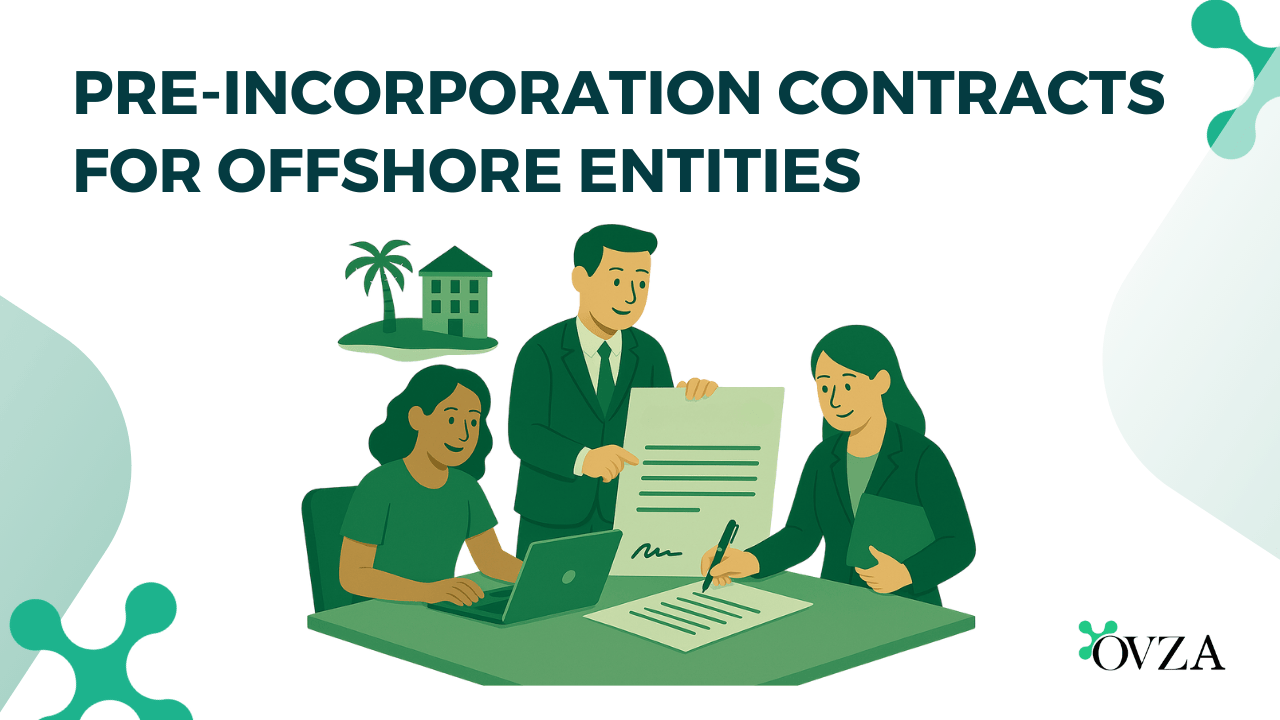Pre-incorporation contracts for offshore entities involve personal liability, statutory adoption, and post-incorporation enforceability across jurisdictions. These contracts are executed on behalf of a legal entity before it has been formally incorporated under the laws of a particular jurisdiction. In the offshore context, such contracts are often necessary to secure business arrangements, lease agreements, investment commitments, or regulatory applications while incorporation is pending. The enforceability and legal effect of such contracts depend on jurisdictional rules governing the capacity of non-existent entities and the obligations of promoters or incorporators acting in anticipation of formal company registration.
Legal Risks and Enforceability
Most offshore jurisdictions adopt common law principles regarding pre-incorporation contracts, though statutory treatment varies. Under common law, a company that does not yet legally exist lacks the capacity to enter into binding contracts. As established in the leading case Kelner v. Baxter (1866), a company cannot ratify a pre-incorporation contract because ratification requires that the principal existed at the time the contract was made. Therefore, unless explicitly displaced by statute, the contract remains personally binding on the promoters or signatories who acted on the company’s behalf.
Several offshore jurisdictions, including the British Virgin Islands and the Cayman Islands, address this issue through statutory reforms that permit conditional enforcement or novation following incorporation. For example, section 29 of the BVI Business Companies Act allows the newly incorporated entity to adopt a pre-incorporation contract if it does so within a reasonable time. In such cases, the rights and obligations are transferred from the individual promoter to the company, releasing the promoter from liability. However, the absence of timely adoption or express novation may expose promoters to continuing contractual responsibility.
The key legal concern in pre-incorporation contracting lies in the personal liability of individuals purporting to act on behalf of the yet-to-be-formed offshore company. Where the law does not permit retroactive adoption or ratification, the promoter may be deemed to have contracted in a personal capacity. This is particularly problematic in high-value transactions or agreements involving multiple jurisdictions, where one or more counterparties may assert breach against the promoter directly. Courts may examine whether the promoter clearly disclosed the non-existence of the company, the intention to incorporate, and the expectation of later ratification or adoption.
Another issue relates to choice of law and dispute resolution. Contracts made prior to incorporation may lack a clearly identified party to bear rights and obligations, raising questions under conflict of laws rules. For instance, the forum court may need to determine which law governs a contract made by a non-existent legal person, or whether arbitration clauses are enforceable against an entity that had not yet come into existence. These questions implicate principles of party capacity, legal personality, and jurisdiction that must be addressed with precision in contractual drafting and structuring.
Offshore promoters and legal counsel may attempt to mitigate these risks by using express terms that condition the contract on subsequent incorporation and adoption. Clauses specifying that obligations shall be assumed only upon company formation, or that the contract is void if incorporation is not completed, are often used in this context. Additionally, local corporate statutes or case law may permit courts to infer novation from the conduct of the company following incorporation, such as performance or acceptance of benefits. However, this remains a fact-specific inquiry and introduces uncertainty absent explicit procedural compliance.
Doctrinal Variations and the Role of Statutory Interpretation
The enforceability of pre-incorporation contracts in offshore jurisdictions depends heavily on local statutory frameworks and judicial interpretations of promoter conduct and corporate formation timelines. While the general rule under common law disfavors binding pre-incorporation arrangements on a non-existent company, some offshore jurisdictions have enacted specific provisions to mitigate this restriction and to facilitate commerce in environments where prompt business structuring is essential.
In the Cayman Islands, section 26 of the Companies Act (2023 Revision) permits contracts to be entered into by promoters on behalf of a proposed company, provided that the company, once formed, expressly adopts the agreement. Until such adoption, the promoter remains personally liable. The statute reflects a legislative effort to strike a balance between the necessity of pre-incorporation commitments and the principle that only legal persons may assume enforceable obligations. However, the requirement of clear post-incorporation adoption continues to present challenges in transactional practice.
Even in jurisdictions that permit statutory adoption, courts have shown a tendency to scrutinize the intent and actions of the parties in determining whether an effective novation has occurred. Merely incorporating the company and continuing operations does not necessarily amount to adoption; affirmative acts such as written resolutions, board approvals, or express confirmations may be required. If the company fails to formally adopt the contract, even where it benefits from its terms, courts may conclude that the promoter remains personally liable under the original agreement.
An important consideration for counsel advising on offshore company formation is the legal distinction between ratification and novation. Since ratification presupposes the prior existence of a principal, it cannot cure the defect of a non-existent legal party. Therefore, reliance on ratification alone is generally ineffective in the context of pre-incorporation arrangements. Novation, on the other hand, is the substitution of one party by mutual agreement of the parties, and may serve as a legally sufficient mechanism to transfer rights and liabilities to the incorporated entity. Drafting contracts with this distinction in mind can reduce uncertainty and litigation exposure.
Furthermore, offshore pre-incorporation contracts often raise questions of authority and fiduciary duty. Promoters acting on behalf of a future company occupy a unique legal position, akin to fiduciaries, and owe duties of good faith and disclosure. If a promoter misrepresents the scope of their authority or fails to incorporate the company as represented, they may be exposed to claims for breach of duty or even fraud. This risk is heightened where third parties are foreign investors or where regulatory approvals hinge on the representations made in the pre-incorporation phase.
Another doctrinal concern arises in relation to jurisdictional inconsistencies in the interpretation of agency law and capacity. In some civil law jurisdictions, the concept of acting on behalf of a non-existent principal may not be recognized at all, rendering any such contract void ab initio. In contrast, common law offshore jurisdictions typically allow for more flexibility, permitting conditional enforcement subject to post-incorporation acts. These divergences must be carefully considered when drafting or negotiating agreements that may be enforced across multiple legal systems.
Offshore Structuring, Legal Certainty, and Practical Drafting
The legal treatment of pre-incorporation contracts in offshore jurisdictions reveals the tension between commercial expediency and foundational principles of legal personality. While statutory reforms in jurisdictions such as the BVI, Cayman Islands, and Seychelles have attempted to harmonize the enforceability of these contracts, they continue to rely on clear procedural compliance and affirmative conduct post-incorporation. Failure to meet such requirements can expose promoters to personal liability, especially in cases where incorporation is delayed or never completed.
Legal advisors involved in offshore structuring must therefore approach pre-incorporation contracts with heightened attention to drafting clarity, governing law selection, and jurisdictional compatibility. Agreements should identify the anticipated entity with precision, define the scope of promoter authority, and include express conditions regarding adoption or novation. These measures provide critical safeguards against unintended obligations and assist in minimizing disputes that could compromise the viability of the newly formed offshore entity.
Offshore pre-incorporation arrangements are also subject to regulatory overlays, particularly when related to financial services licensing, AML compliance, or economic substance laws. For example, initiating business operations or holding client funds under a pre-incorporation entity may violate local financial regulations, exposing promoters and eventual companies to administrative penalties or revocation of future registration. These regulatory intersections must be integrated into a broader due diligence framework during the pre-incorporation phase.
Conclusion
Pre-incorporation contracts for offshore entities sit at the intersection of corporate law, contract doctrine, and private international law. While offshore jurisdictions provide mechanisms to facilitate adoption of these agreements post-incorporation, their enforceability is not guaranteed absent proper procedural compliance. Promoters may remain personally liable if the company fails to ratify or novate the contract, and courts will closely examine both form and substance in determining responsibility. Legal practitioners must approach pre-incorporation structuring with detailed knowledge of the relevant statutory frameworks and draft agreements that anticipate both successful incorporation and potential litigation over obligations assumed during this interim phase.
Disclaimer: The information provided on this website is intended for general reference and educational purposes only. While OVZA makes every effort to ensure accuracy and timeliness, the content should not be considered legal, financial, or tax advice.










